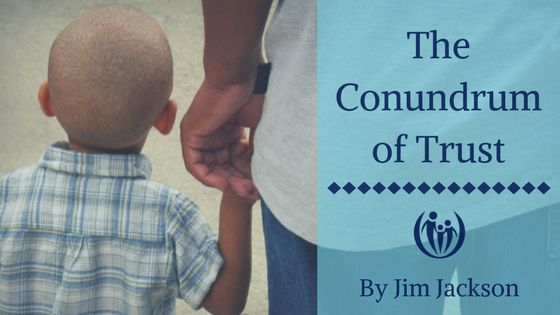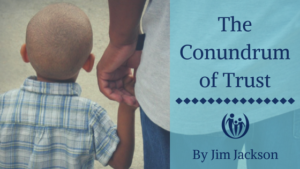
The Conundrum of Trust

When kids trust they feel safe; they know they’re loved. Trust leads to respect and true obedience. Kids who trust look to their parents for wisdom and follow their parents’ examples in desirable ways.
Where trust fails, relationships fail too, even in those where love is high. So earning kids’ trust is perhaps the most important thing a parent can do to express love to their children, and “train them in the way they should go”.
Kids are built to trust, built to feel safe and secure. But if trust is betrayed and not restored, the kids are hurt and they live in resentment. They rebel. They hurt back. They disregard what parents say is important because they don’t trust it. They may do what they are asked to do out of fear, or to get what they want, but it’s not out of trust.
The problem here is huge and has plagued humanity since the beginning: We parents are destined to fail in our efforts to gain trust. We can’t get it right, and we’re bad at acknowledging our own shortcomings. We get defensive and protective. So if earning trust is so important but is something parents can’t totally get right, how are we ever to earn our kids’ trust?
Successfully earning trust must include the confession that you will fail.
A recent encounter with my 24-year-old daughter sheds light on gaining trust. I recently asked her what she thought was my greatest strength as a parent. My pride was unprepared for her answer. I was thinking she’d say something about my wisdom, creativity, or my faith. Perhaps my positivity or ability to have fun even in tough times. She said no such thing. She confidently said without hesitation, “You apologized well.”
And herein lies the conundrum of earning trust when I have yet to attain perfection. Earning trust is as much about admitting when you’ve gotten it wrong as it is about getting it right. You see, whether or not our kids can say it out loud, they intuitively know when we parents have blown it, when we have impatiently disciplined, selfishly made a demand, or thoughtlessly ignored them. The kids feel confused, hurt, ignored or otherwise resentful. Many parents don’t notice that this is happening. Others justify their actions, or just vow to themselves to do better in the future.
But kids don’t forget. Their intuition leaves them feeling unsettled, unsafe and untrusting. The unsettled feelings become the mortar for bricks in a defensive wall. The mortar will dry and bricks will be added if the unsettled feelings are not resolved. Working harder to do better in the future will not undo the hurt from the past. The hurt needs to be revealed and healed if our kids’ trust is to be regained, if they are to feel safe with us. It is up to us to recognize our failures and the effects of those failures on the kids. It is our job to have the humility to speak it out loud so that the kids have words to accompany their intuition. When we can put words to our kids’ intuition about our parenting mistakes, we become safe again. We gain authority. We earn trust.
Here are the basics we teach parents for earning trust:
- Figure out and write down the kind of parent you want to be. This is your parenting vision.
- Tell the most important people in your life your vision and enlist their feedback – even your kids.
- Act on your vision. Be committed to it, and to working through your challenges.
- Ask yourself frequently, “How am I doing? What are my kids seeing? Is this what I want them to see?”
- Ask your kids how you’re doing. Give them permission to tell you when you’ve missed the mark.
- Learn to admit and apologize when you’ve blown it.
- Repeat.
I’m 54 years old. I’ve eaten a lot of humble pie in my day. I’ve seen myriads of parents benefit from this teaching, but I’m still learning the basics myself. I still blow it often. And when I do I eat humble pie again by admitting it and apologizing (which is still difficult sometimes because I remain more stubborn than I’d like to be). The complex taste of this pie has grown on me over the years and I find it increasingly rewarding to eat it as the years go by.
Perhaps you’d join me for a piece?
What are your parenting strengths?
You’ve got them. Knowing your strengths will help you become the best parent you can be. Knowing your parenting challenges is useful information too. Take our FREE ASSESSMENT.

